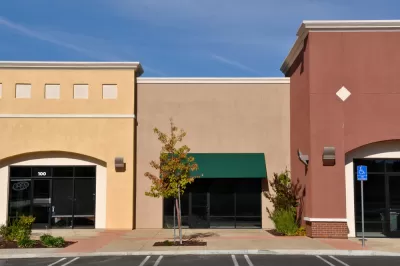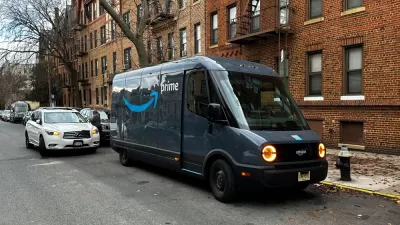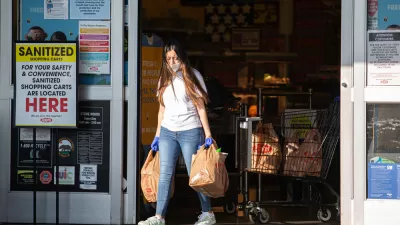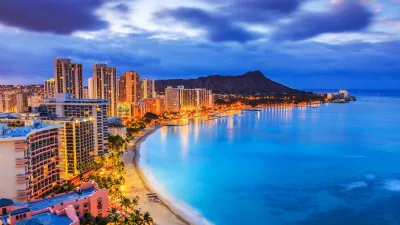The race to deliver goods at lightning speed has the potential to create 'dark cities' as street-level storefronts give way to closed-off warehouses only frequented by delivery workers.

Lev Kushner and Greg Lindsay posit that the growing trend of 'instant' delivery services "threatens to transform downtowns into dark cities, where the everyday commerce that gives streets their vitality has evaporated from view and been reconstituted on an app."
According to Kushner and Lindsay, app-based delivery services have started to occupy significant portions of commercial real estate in cities, replacing formerly vibrant storefronts with private warehouses. This threatens not just urban street life, they argue, but also the small businesses and restaurants that used to occupy street-level retail spaces. "The demand for convenience is seemingly bottomless, but no city has yet found a way to balance the short-term benefit of personal convenience against the long-term costs of eroding community life through decreased social interaction."
The article cautions public officials to anticipate the impact of these new business models, rather than try to retroactively regulate a new industry like they have with ride-hailing and short-term rentals. The authors recommend simplifying retail permitting, developing policies that incentivize mixed-use development, and improving transportation infrastructure to prepare for more delivery vehicles and workers.
While there is a place for a delivery industry, the article warns, "cities need to start thinking seriously, now, about how residents’ personal choices, and the businesses that respond to those demands, can unintentionally transform our cities and communities." In the same way that ride-hailing has added to congestion and vacation rentals have destabilized local housing markets, the 15-minute delivery model could have significant unintended impacts on urban life.
FULL STORY: The Dark Side of 15-Minute Grocery Delivery

Alabama: Trump Terminates Settlements for Black Communities Harmed By Raw Sewage
Trump deemed the landmark civil rights agreement “illegal DEI and environmental justice policy.”

Study: Maui’s Plan to Convert Vacation Rentals to Long-Term Housing Could Cause Nearly $1 Billion Economic Loss
The plan would reduce visitor accommodation by 25% resulting in 1,900 jobs lost.

Planetizen Federal Action Tracker
A weekly monitor of how Trump’s orders and actions are impacting planners and planning in America.

Waymo Gets Permission to Map SF’s Market Street
If allowed to operate on the traffic-restricted street, Waymo’s autonomous taxis would have a leg up over ride-hailing competitors — and counter the city’s efforts to grow bike and pedestrian on the thoroughfare.

Parklet Symposium Highlights the Success of Shared Spaces
Parklets got a boost during the Covid-19 pandemic, when the concept was translated to outdoor dining programs that offered restaurants a lifeline during the shutdown.

Federal Homelessness Agency Places Entire Staff on Leave
The U.S. Interagency Council on Homelessness is the only federal agency dedicated to preventing and ending homelessness.
Urban Design for Planners 1: Software Tools
This six-course series explores essential urban design concepts using open source software and equips planners with the tools they need to participate fully in the urban design process.
Planning for Universal Design
Learn the tools for implementing Universal Design in planning regulations.
Caltrans
Smith Gee Studio
Institute for Housing and Urban Development Studies (IHS)
City of Grandview
Harvard GSD Executive Education
Toledo-Lucas County Plan Commissions
Salt Lake City
NYU Wagner Graduate School of Public Service





























